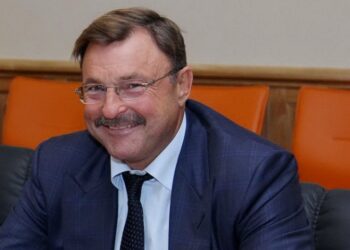“United Russia” announced a competition for hackers to identify vulnerabilities in the party system of electronic preliminary voting (primaries). The competition will last a week, the winner will receive a cash prize, but United Russia preferred to keep the amount of remuneration secret. The organizers call for students of specialized educational institutions to take part in the competition.
Intra-party preliminary voting this year will be held from May 22 to 28, the results are scheduled to be summed up on May 30. United Russia has been using the electronic format of the primaries since 2018, and since 2020 it has become the main one, said on Thursday during a round table “Electronic preliminary voting of United Russia: security, legitimacy and convenience for users,” the head of United Russia’s IT projects Vyacheslav Sateev. According to him, in 2018, more than 60 thousand people used the online format at the primaries, more than 1 million people used the online format during the pandemic, when the primaries were held only electronically, and the federal campaign-2021 became a record: according to Mr. Sateev, then participation in More than 6 million Russians took part in the electronic preliminary voting of United Russia.
Deputy Secretary of the United Russia General Council Sergei Perminov said that this year the primaries for the first and fourth models will be held only in digital format – these are 183 campaigns in 55 regions, including in the new regions of the Russian Federation.
Recall that United Russia uses four models of intra-party preliminary voting. The first – open – provides that any citizen who lives in the territory of a given polling station can be an elector. The fourth model assumes that the composition of electors is formed from among the members of the party.
Mr. Perminov clarified that voter registration in the party electronic voting system will be carried out, as before, through the Gosuslugi portal, which is “trusted by people.” According to United Russia, on the morning of May 10, 1.5 million voters had already registered in the system, which is approximately 6.5% of their total number in the elective regions. The goal of United Russia is to register at least 10% of voters living in the territories where election campaigns will be held in 2023: according to Mr. Perminov, this is about 2.5 million people.
E-voting in the primaries of United Russia, as well as remote e-voting in official elections, is carried out using blockchain technology. Vyacheslav Sateev said that during the primaries the party will use 40 servers in four data centers. According to him, the number of DDos attacks on the system during the preliminary voting period is usually in double digits, but so far the personal data of citizens have not been hacked. “I hope that this year, despite the multiple increase in attempts to hack our system after the start of a special military operation, we will pass this campaign with dignity,” Mr. Sateev said.
To test the reliability of the system, United Russia decided to organize a competition for hackers to identify its vulnerabilities.
To do this, the party has created a copy of its electronic infrastructure – it is located at https://pg-test.er.ru/. Within a week, any hacker will have the opportunity to test the system for strength, while any citizen of Russia, regardless of the region of residence, will be able to register as an elector. As Mr. Sateev explained, two achievements will be considered successful results of the contest: demonstration in any form of a table with a database of system users and saving a correct vote in the blockchain, but cast either without authorization or on behalf of another person. Successful results will need to be documented and sent to United Russia mail. The winner will receive a financial reward, but the party members preferred not to announce the specific amount. “Hopefully there will be a winner. I will be scolded here for the fact that we have some kind of problem or some kind of vulnerability, but I will sleep more calmly from May 22 to May 28. I very much look forward to attracting colleagues from specialized educational institutions to the competition,” Vyacheslav Sateev summed up.
Note that this is not the first competition for hackers who are invited to discover vulnerabilities in the electronic voting system. Such an award was invented and established three times in Moscow, where its own platform for online elections has been used since 2019, by journalist and former head of the Moscow election observation headquarters Alexei Venediktov (included by the Ministry of Justice in the register of foreign agents). In 2019, the system was hacked by the French cryptographer Pierric Gaudry and received 1 million rubles for it. from the personal funds of Mr. Venediktov. In 2020, the system was not hacked, and the prize was divided between the developers of the system and journalists writing about online voting. In 2021, 1 million rubles. divided between two hackers and members of the electronic voting technical working group. In particular, 350 thousand rubles. received by a Muscovite who was able to reduce the time of delayed voting (the standard vote change time is once every three hours), and also tested the most diverse scenarios for hacking the DEG system. Another 150 thousand rubles. went to a hacker who was able to refuse one of the two ballots: each participant in the test vote was supposed to receive them in a set, but the programmer managed to get around this rule. After 2021, the award was not established in Moscow.








